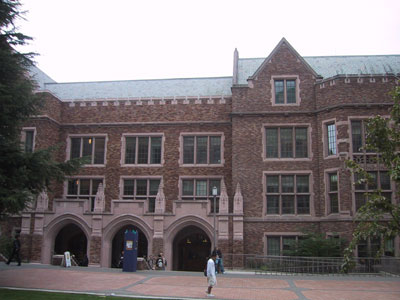By the time I entered the University of Washington, I had already developed strong research skills, and I was painfully familiar with the standards employed in evaluating academic scholarship. After all, I had already written a 260-page dissertation on English literature, and I felt like a pro when it came to research. However, I had not counted on the substantive differences between research in the social sciences and research in the humanities. In the humanities, we are primarily concerned with interpretation and argumentative rhetoric; in the social sciences, we focus on statistical data, concrete evidence, and practical applications. This difference has a great impact on scholarship, and I discovered research methods that were entirely new to me. Assessing the differences in the research methods of various disciplines was a fascinating part of my development while at the iSchool, and, at this point, I feel like I have a solid grasp on scholarly conventions used in both the social sciences and humanities.
This understanding will be particularly useful if I were to become a subject specialist, but it will also benefit my development as a librarian in other fields for it allows me to make finer distinctions about user needs. For instance, while the needs of a social scientist and of a humanities scholar fall under the rubric of academic research; they will take vastly different approaches to their work and will require the proper sources. Likewise, a novelist who visits a public library will have different needs than a journalist, even though they are both writers, or a database engineer will have different needs from a software tester, although they make work in the same company. The ability to make fine distinctions by considering the approaches taken by various users is one benefit from conducting social science research that ensures that I will be a more thoughtful librarian.
Human Information Behavior

The iSchool at Mary Gates Hall
During my first term at the iSchool, I was introduced to the concept of human information behavior, and I began to understand how research in the social sciences takes an entirely different approach to analyzing information. For the first time, I worked with surveys and codebooks, and I began to realize how tricky it can be to find empirical evidence when studying human beings and their interactions.
This complexity was made particularly evident in a group project for the course. We were asked to prepare a Producer presentation that would describe the information-seeking behavior of a specific user group. Always ambitious, our group decided to investigate the information-seeking patterns of artists. This topic proved particularly challenging because of the predominant notion that artists look for inspiration rather than information. In order to describe what we had discovered, my group developed a model for the information-seeking patterns of artists. This model went beyond the expectations of the class, and it provided me with a sense of how to conduct scholarly work in the social sciences. It still stands as a project that particularly pleased me because I knew, without a doubt, that I had learned much during the course of putting together that presentation.
Public Library Services to Spanish-Speaking Patrons
In a class for research methods, my group developed a project that would assess the needs of Spanish-speakers who used the Yakima Valley library system. We were interested in understanding the preferences of Spanish-speakers so that we could think about how to create services that would make a difference to the Spanish-speaking community. Among other elements, our project discussed our methodology, presented a hypothesis, provided an assessment of limitations and strengths, and called upon us to analyze the sample population. We also drew up a questionnaire, created a research design, and developed a data collection method.

Chained book at the Oxford Library
During the course of this project, I was again struck by the vast differences between social science and humanities research. For instance, while reviews of literature, discussions of research methods, and calls for further work may be expected in both disciplines, one rarely has to consider the ethical implications of studying To the Lighthouse . However, this question is an important part of social science research. In addition, I noted that social sciences researchers often employ highly structured research methods that rely upon the actions of others while humanities scholars will concentrate on the articulation of independent thought. Humanities scholars do not need to consider variables that might impact the outcome of their study. The differences between the two ensured that my research in the social sciences represented a departure from the familiar for me.
Libraries and Writing Centers
Because of my interest in writing, I met with a librarian at the University of Washington who has a strong interest in information literacy and its relationship to analytical writing. He wanted more information on academic programs that had forged a connection between libraries and writing centers. Along with another graduate student working at the University of Washington Libraries, I volunteered to conduct a review of the literature on the topic and to create an annotated bibliography for his use in developing similar programs at UW.
While I had already conducted many literature reviews and had drawn up several annotated bibliographies, this work was particularly interesting to me because it had such a practical application. Unlike the work I had done before, this research would be used in making decisions about the direction of the libraries, and that aspect lent a certain significance to the projects. That social science research addresses practical applications was underscored by performing this project, and the development of tools to measure efficacy of teaching programs was particularly illuminating. It helped me to see how libraries need to have documentation to demonstrate their value to a user group or community, and I expect this lesson will be quite useful throughout my career.